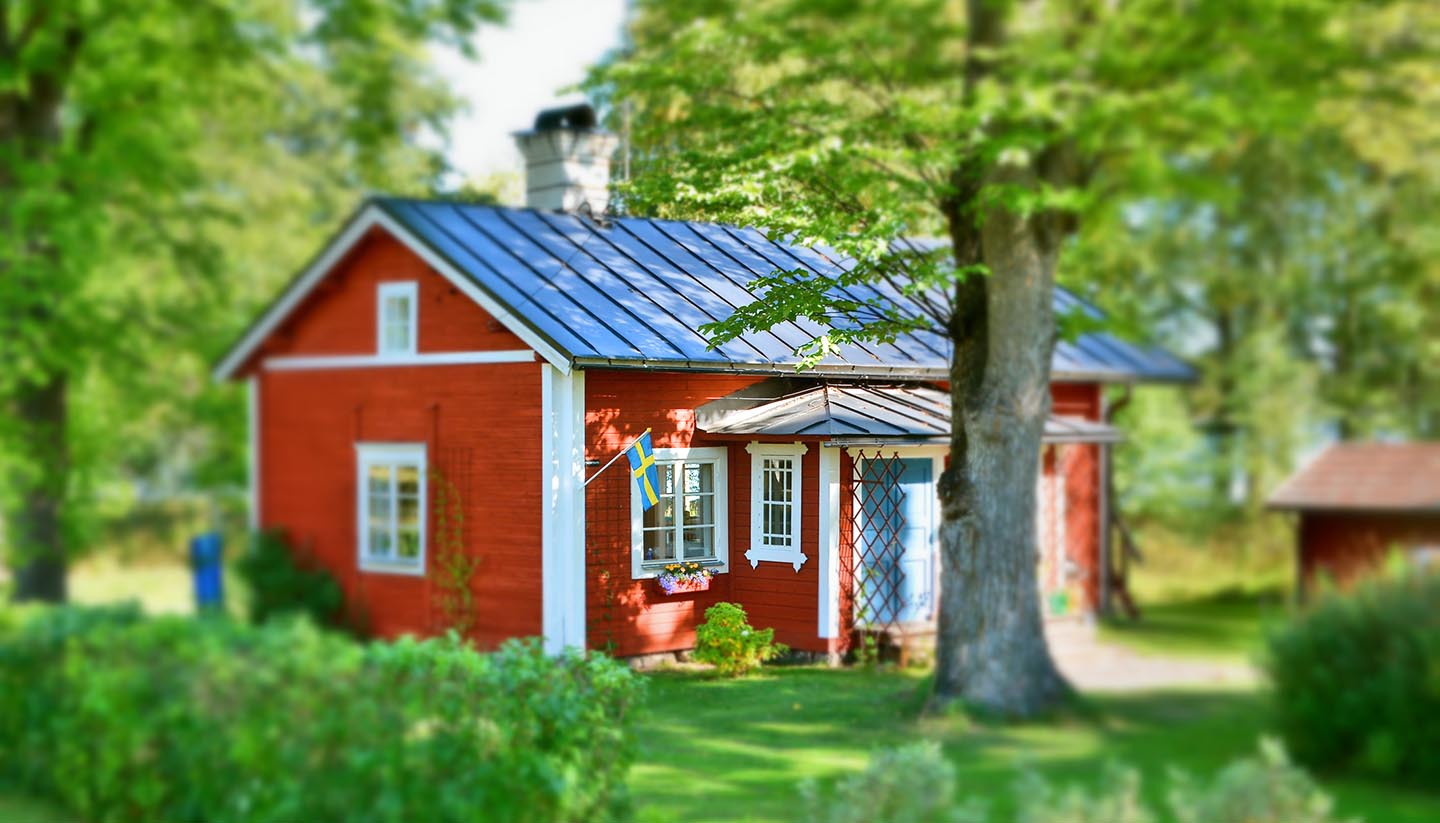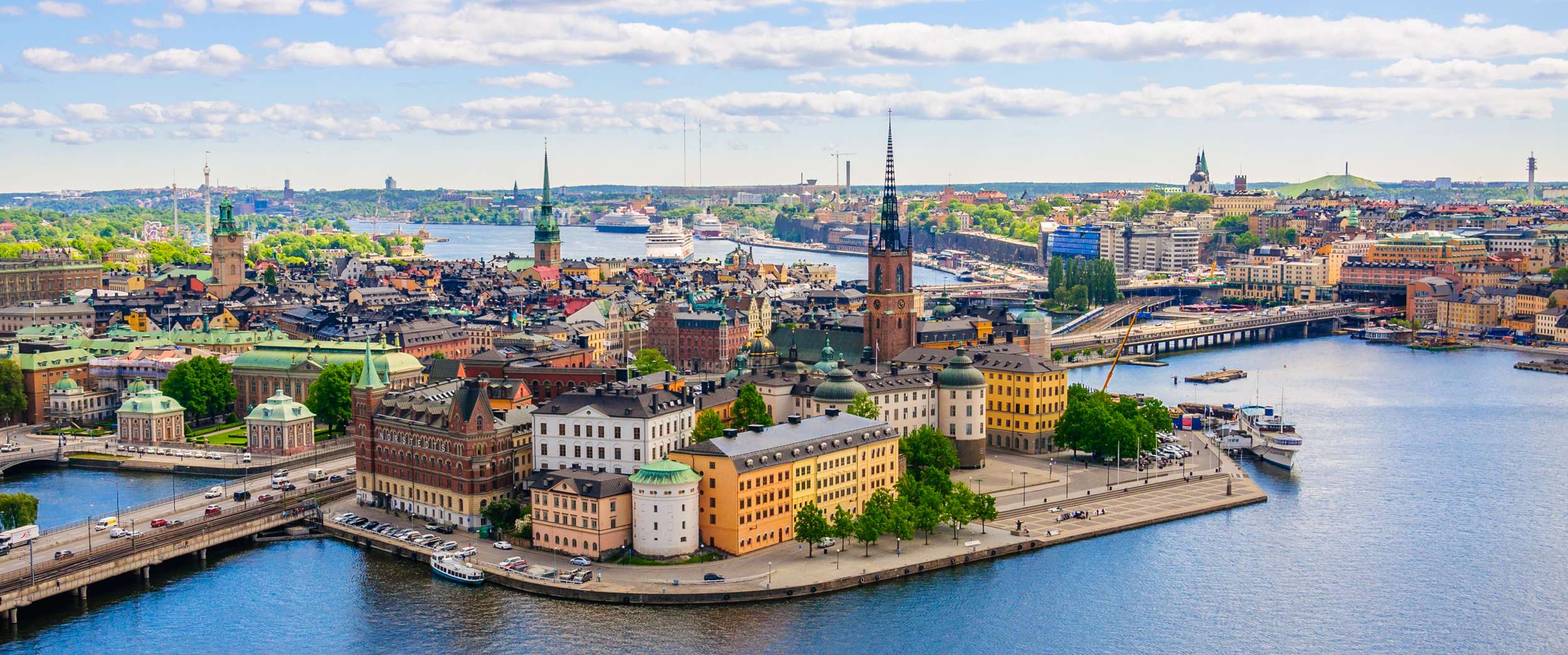Sweden travel guide
About Sweden
Sweden is a land of incredible contrasts, from the dense pine forests and craggy mountains of the north, to the rolling hills and glossy golden beaches of the south. But the diversity doesn't stop at the suburbs, with each of Sweden's seven major cities boasting its own character, history and unique architectural style.
Bordered by Denmark to the south, Norway to the west and Finland to the east, Sweden, the largest of the Scandinavian countries, boasts a long mercantile history that has made it one of the most culturally open and welcoming in Europe.
The instantly likeable capital Stockholm has long been synonymous with style and its sharply tailored brand of chic has percolated throughout the wardrobes of the world. Hipsters notwithstanding, Stockholm, with its 14 islands and medieval beauty, has much to offer those in search of culture, art and historical treasures. However, perhaps the most surprising city is Malmö, which has belied its unfairly grim reputation to become one of the country's liveliest destinations.
Beyond the cities, Sweden's countryside has a gentler charm than the rugged landscapes of neighbouring Norway. Much of Sweden is forested and there are thousands of lakes, including the large stretches of water between Gothenburg and Stockholm. The border with Norway is home to the spectacular Skanderna (Scandinavian) mountain chain, while in the far north you'll find wonderfully bleak Arctic tundra, where you can see the Northern Lights. The south is dominated by emerald forests, the cerulean waters of the Gulf of Bothnia and the jagged Baltic coastline. Of all the lovely spots in Sweden though, the awe-inspiring panoramas of the Stora Sjöfallet National Park take some beating. Part of the UNESCO-listed Laponian region of northern Sweden, the park's majestic waterfalls, soaring peaks and crowded clumps of fir trees make it one of the country's greatest natural treasures.
The Swedes are proud of their green country and believe the great outdoors should be available to everyone. Allemansrätten – the everyman's right – is a constitutional right that allows the public access to public and privately owned land for recreation. As long as you do not disturb or destroy nature, or infringe on the privacy of others (such as by walking too close to their house), you are free to roam the countryside. This right even allows people to pick wildflowers, berries and mushrooms – unless they are endangered.
Key facts
449,964 sq km (173,732 sq miles).
9,851,852 (UN estimate 2016).
21.8 per sq km.
Stockholm.
Constitutional monarchy.
King Carl XVI Gustaf since 1973.
Prime Minister Ulf Kristersson since October 2022.
Travel Advice
Before you travel
No travel can be guaranteed safe. Read all the advice in this guide. You may also find it helpful to:
- see general advice for women travellers
- read our guide on disability and travel abroad
- see general advice for LGBT+ travellers
- read about safety for solo and independent travel
- see advice on volunteering and adventure travel abroad
Travel insurance
If you choose to travel, research your destinations and get appropriate travel insurance. Insurance should cover your itinerary, planned activities and expenses in an emergency.
About FCDO travel advice
The Foreign, Commonwealth & Development Office (FCDO) provides advice about risks of travel to help you make informed decisions. Find out more about FCDO travel advice.
Get travel advice updates
Sign up to get email notifications when this travel advice is updated.
Follow FCDO:
This information is for people travelling on a full ‘British citizen’ passport from the UK. It is based on the UK government’s understanding of the current rules for the most common types of travel.
The authorities in Sweden set and enforce entry rules. If you’re not sure how these requirements apply to you, contact the Swedish Embassy in the UK.
Passport validity requirements
Sweden follows Schengen area rules. Your passport must:
- have a ‘date of issue’ less than 10 years before the date you arrive – if you renewed your passport before 1 October 2018, it may have a date of issue that is more than 10 years ago
- have an ‘expiry date’ at least 3 months after the day you plan to leave the Schengen area (the expiry date does not need to be within 10 years of the date of issue)
Check with your travel provider that your passport and other travel documents meet requirements. Renew your passport if you need to.
You will be denied entry if you do not have a valid travel document or try to use a passport that has been reported lost or stolen.
Visa requirements
You can travel without a visa to the Schengen area, which includes Sweden, for up to 90 days in any 180-day period. This applies if you travel:
- as a tourist
- to visit family or friends
- to attend business meetings, cultural or sports events
- for short-term studies or training
The requirements for working in Sweden are different.
If you’re travelling to other Schengen countries as well, make sure your whole visit is within the 90-day visa-free limit. Visits to Schengen countries in the 180 days before you travel count towards your 90 days. If you overstay the 90-day visa-free limit, you may be banned from entering Schengen countries for up to 3 years.
Make sure you get your passport stamped on entry and exit.
If you’re a visitor, border guards will look at your entry and exit stamps to check you have not overstayed the 90-day visa-free limit for the Schengen area.
If your passport is missing a stamp, show evidence of when and where you entered or left the Schengen area (for example, boarding passes or tickets) and ask the border guards to add the date and location in your passport.
At Swedish border control, you may also need to:
- show a return or onward ticket
- show proof of your accommodation, for example, a hotel booking
- show proof of your travel insurance
- prove that you have enough money for your stay
Staying longer than 90 days in a 180-day period
To stay longer, you must meet the Swedish government’s entry requirements. Check which type of visa or work permit you need with the Swedish Embassy in the UK.
If you stay in Sweden with a residence permit or long-stay visa, this does not count towards your 90-day visa-free limit.
See passport stamping if you live in Sweden.
Border controls on arrival from Denmark and Germany
Border controls are in place in Sweden for people travelling from Denmark via the Öresund crossing and arriving on ferries from Denmark and Germany.
New Schengen entry requirements
The EU’s Entry/Exit System (EES) is expected to start in October 2025. It is not currently in operation. The European Union will inform about the specific start date of the EES before its launch.
Read more information on the EU Entry/Exit System.
Travelling with children
Carry a letter of consent from the parent or guardian of children aged 17 and under who are travelling with you.
Vaccine requirements
For details about medical entry requirements and recommended vaccinations, see TravelHealthPro’s Sweden guide.
Customs rules
There are strict rules about goods that you can take into and out of Sweden. You must declare anything that may be prohibited or subject to tax or duty.
Taking food and drink into Sweden
You cannot take meat, milk or products containing them into EU countries. There are some exceptions such as powdered baby milk, baby food and special foods or pet feed required for medical reasons.
Taking money into Sweden
Declare cash or travellers cheques if the value is 10,000 euros or more. You will get a certified declaration to show you brought it in with you. If you do not, your money could be seized when you leave.
Many shops, cafes and restaurants do not accept cash, so make sure you have a debit or credit card with you.
Terrorism
There is a high threat of terrorist attack globally affecting UK interests and British nationals, including from groups and individuals who view the UK and British nationals as targets. Stay aware of your surroundings at all times.
UK Counter Terrorism Policing has information and advice on staying safe abroad and what to do in the event of a terrorist attack. Find out how to reduce your risk from terrorism while abroad.
Terrorism in Sweden
Terrorists are likely to try to carry out attacks in Sweden.
Attacks could be indiscriminate, including in places frequented by foreign nationals.
The authorities in Sweden have successfully disrupted a number of planned attacks and made a number of arrests.
Political demonstrations
Demonstrations in Sweden are usually peaceful. Avoid demonstrations wherever possible and follow the advice of the local authorities.
Crime
Protecting your belongings
Take particular care of your belongings in major cities as pickpockets often target tourists for passports and cash.
Violent crime does occur. Gang-related crime, including knife crime, shootings and explosions, has been reported in Malmö, Stockholm and Gothenburg.
Laws and cultural differences
There are heavy punishments for importing illegal drugs. There is zero tolerance towards drugs; even petty drug use will lead to a penalty.
Paying for sex is illegal.
Physical punishment of children is illegal.
LGBT+ travellers
Same-sex sexual activity is legal in Sweden. Read more advice for LGBT+ travellers.
Transport risks
Road travel
If you are planning to drive in Sweden, see information on driving abroad and check the rules of the road in the RAC’s Sweden guide. The guide lists driving regulations and other legal requirements you need to be aware of.
You need a UK driving licence to drive in Sweden. Hire car companies often have stricter requirements for their customers, such as a year of driving experience and a minimum age.
During winter, snow and ice on the roads cause accidents daily. From 1 December to 31 March, and any other times designated by the police, all vehicles must have winter tyres.
Extreme weather and natural disasters
Arctic travel
Parts of Sweden are in the Arctic Circle, including some very remote areas of land. Emergency medical assistance and search and rescue are limited in these areas. See Arctic travel safety advice.
Before you travel check that:
- your destination can provide the healthcare you may need
- you have appropriate travel insurance for local treatment or unexpected medical evacuation
This is particularly important if you have a health condition or are pregnant.
Emergency medical number
Dial 112 and ask for an ambulance.
Contact your insurance or medical assistance company quickly if you’re referred to a medical facility for treatment.
If you’re visiting remote areas, consider how easily you will be able to access emergency services.
Vaccine recommendations and health risks
At least 8 weeks before your trip:
- check the latest vaccine recommendations for Sweden
- see where to get vaccines and whether you have to pay on the NHS travel vaccinations page
See what health risks you’ll face in Sweden, including:
- biting insects and ticks
- mpox – also see Sweden’s Public Health Authority website which includes updates on mpox
Medication
The legal status and regulation of some medicines prescribed or bought in the UK can be different in other countries.
Read best practice when travelling with medicines on TravelHealthPro.
Healthcare in Sweden
FCDO has a list of medical providers in Sweden where some staff will speak English.
Health insurance cards
To get medically necessary state healthcare in Sweden, you need a Global Health Insurance Card (GHIC) or a European Health Insurance Card (EHIC).
The NHS’s getting healthcare abroad webpage has details about:
- how to apply for a GHIC
- how to get temporary cover if you lose your card or it does not arrive in time
- who qualifies for a new EHIC instead of a GHIC
- what treatment counts as medically necessary
A GHIC or EHIC is not an alternative to travel insurance. You may have costs your GHIC or EHIC does not cover, including:
- changes to travel and accommodation bookings
- additional standard costs for treatment
- medical repatriation to the UK
- treatment that is ruled non-urgent
- private healthcare
- private clinics
There is also guidance on healthcare if you’re living in Sweden.
Travel and mental health
Read FCDO guidance on travel and mental health. There is also mental health guidance on TravelHealthPro.
The Foreign, Commonwealth & Development Office (FCDO) cannot provide tailored advice for individual trips. Read this travel advice and carry out your own research before deciding whether to travel.
Emergency services in Sweden
Telephone: 112 (ambulance, fire, police)
Contact your travel provider and insurer
Contact your travel provider and your insurer if you are involved in a serious incident or emergency abroad. They will tell you if they can help and what you need to do.
Refunds and changes to travel
For refunds or changes to travel, contact your travel provider. You may also be able to make a claim through insurance. However, insurers usually require you to talk to your travel provider first.
Find out more about changing or cancelling travel plans, including:
- where to get advice if you are in a dispute with a provider
- how to access previous versions of travel advice to support a claim
Support from FCDO
FCDO has guidance on staying safe and what to do if you need help or support abroad, including:
- finding English-speaking lawyers, funeral directors and translators and interpreters in Sweden
- dealing with a death in Sweden
- being arrested or imprisoned in Sweden
- getting help if you’re a victim of crime
- what to do if you’re in hospital
- if you’re affected by a crisis, such as a terrorist attack
Contacting FCDO
Help abroad
See how to get help from the UK government abroad including in an emergency.
Help in the UK
You can call FCDO in London if you need urgent help because something has happened to a friend or relative abroad.
Telephone: 020 7008 5000 (24 hours)
Get travel advice updates
Sign up to get email notifications when this travel advice is updated.
Follow FCDO:
Risk information for British companies
The Overseas Business Risk service offers information and advice for British companies operating in Sweden on how to manage political, economic, and business security-related risks.




